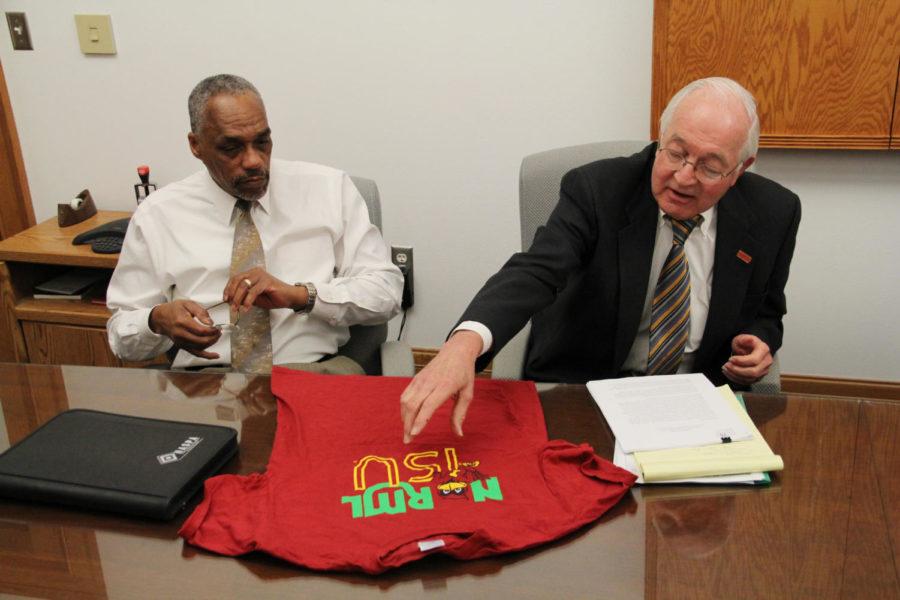Editorial: First Amendment at heart of trademark dispute
Photo: William Deaton/Iowa State
Tom Hill, senior vice president of Student Affairs, and Warren Madden, senior vice president for Business and Finance, look at the NORML ISU T-shirt during a meeting with the club. The shirt is the subject of controversy due to the logo of ISU mascot Cy being used, since the use of marijuana is illegal.
November 27, 2018
The fall semester has been fraught with the First Amendment, both in students advocating their right to use it, but also in fighting for it.
Currently, a petition is circulating between student organizations that highlights the frustration of campus clubs regarding the university’s recent implementation of a new trademark policy.
The petition alleges that the manner “in which this policy was devised and implemented was unfair and disrespectful” and that the new policy “severely limits [the] ability to represent both the university and ourselves.”
Over the course of the next week, the petition will be available to sign at different club meetings across campus.
Already this semester, student organizations have rallied against the trademark policy through organizing a town hall, meeting with administrators and through a resolution passed by Student Government.
This is the First Amendment in action.
The First Amendment guarantees the right to peacefully assemble, as demonstrated by the decision for student organizations to come together for a town hall to discuss their next steps regarding this issue.
The First Amendment guarantees the right to petition, as is currently happening among the student organizations to be given to administration.
The First Amendment also guarantees a free press, as demonstrated by the countless articles and the four editorials previously written on this specific trademark policy.
And what this issue boils down to, for both the student organizations contesting the university’s decision and the administrators who imposed it, is the First Amendment itself.
This isn’t the first time the university has found itself spiraling down a First Amendment rabbit hole in relation to a trademark dispute. Just four years previous, there was a long battle in the courts between Iowa State’s National Organization for the Reform of Marijuana Laws (NORML) chapter and Iowa State administrators.
The reason? NORML ISU printed a t-shirt — with the university’s approval — that featured Cy the Cardinal’s head in place of the “O” in NORML. On the back of the t-shirt read, “Freedom is NORML at ISU” with a marijuana leaf placed above the group’s name.
After a profile by the Des Moines Register in 2012 that prominently displayed a photo of the group and its t-shirt, Iowa State began to receive negative criticism for its affiliation to the organization and the use of Cy the Cardinal on the t-shirt.
Because of this, the university rescinded approval of the t-shirt.
The next year, Iowa State revised its trademark guideline to include a clarification that the university logo cannot be used to show endorsement of certain items such as illicit drugs and Iowa State’s name cannot be used to imply endorsement.
In doing so, t-shirt designs submitted by NORML ISU were continuously denied. This led NORML ISU to the administrators involved, citing that they engaged in “unconstitutional viewpoint discrimination in violation of the First Amendment by subjecting NORML ISU’s t-shirt designs to unusually heavy, politically motivated scrutiny.”
And NORML ISU won. So, the university petitioned the court to reconsider its ruling. And NORML ISU won again.
While this case is starkly different from the one before student organization’s today, it’s difficult to not draw parallels between the two issues: a university seeking to protect its name and image; and a student body feeling excluded, disassociated and financially burdened by its administrators and campus community — the First Amendment at the helm.

















